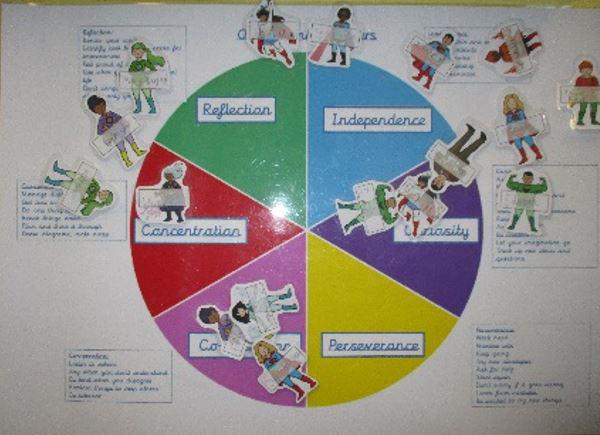

Our Learning Powers

Our Learning Powers
To create a culture of positive behaviour for learning at Flyford Flavell First School we use a range of specific learning characteristics, that we call ‘learning powers’. These powers form a learning power wheel which is used in place of a behaviour ‘zone board’. We believe this focuses behaviour on positivity and shows the children exactly how they are being good learners. This is significant and explicit because, rather than a generic ‘well done’, learning powers enable the children to know how to repeat their successful behaviour. The learning powers are taught through Early Years and KS1 so that the children understand their meanings. The children learn to become fluent and articulate about how exactly they are learning and what they could do better, through the learning powers of Independence, Curiosity, Co-operation, Perseverance, Concentration and Reflection.
The learning powers are introduced gradually, building up as the children move through the school. In Reception the children begin by learning the powers of Independence, Curiosity and Co-operation. In Year 1 they also learn the power Concentration. From Year 2 the children use all the learning powers.
Independence
To become independent we teach and encourage the children to be self-directed, motivated, problem solve, take ownership of their work and behaviour, select their own resources and have a positive attitude to learning.
Curiosity
We encourage the children to be curious about learning by asking them to ask questions, notice things, look for patterns and connections, reason, research, ask ‘what if…?’, be creative, use their imaginations and think up new ideas.
Co-operation
Co-operation is introduced early on in Reception to encourage to the children to become helpful, kind and polite members of the school community. They are taught to listen to others, say when you don’t understand, be kind when they disagree, explain things to help others and to be tolerant.
Perseverance
The children learn the value and impact of perseverance by being encouraged to practise lots, keep going, trying new strategies, asking for help from their learning partners and teachers, starting again when appropriate, not worrying if it goes wrong and learning from mistakes!
Concentration
We teach the enjoyment and success that can come from concentration by encouraging children to ‘get lost in a task’, draw diagrams and make notes, manage distractions themselves, focus on one thing at a time if needed, break things down and plan and think things through.
Reflection
Children from Year 2 onwards learn to become reflective learners. They review their own work, identify the most successful parts and improvements to be made, they are encouraged to feel proud of achievements and to not compare themselves to others, but only themselves!

